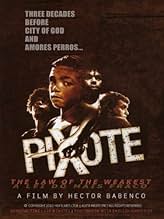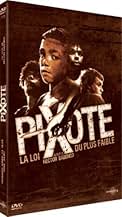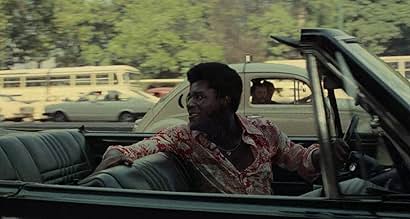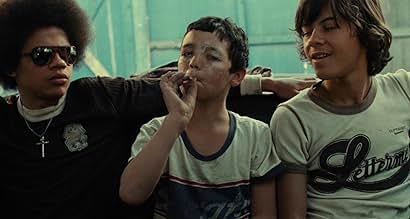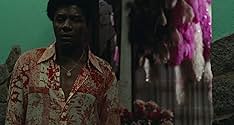CALIFICACIÓN DE IMDb
7.9/10
10 k
TU CALIFICACIÓN
Narra la vida de un niño involucrado en la delincuencia, la prostitución y las drogas.Narra la vida de un niño involucrado en la delincuencia, la prostitución y las drogas.Narra la vida de un niño involucrado en la delincuencia, la prostitución y las drogas.
- Dirección
- Guionistas
- Elenco
- Premios
- 10 premios ganados y 4 nominaciones en total
João José Pompeo
- Almir
- (as Joáo José Pompeu)
Rubens Rollo
- Director
- (as Ruben Rollo)
Luis Serra
- Reporter
- (as Luiz Serra)
Opiniones destacadas
10shneur
This is a difficult movie to watch, and would have been even more difficult had I known then that the actor playing the protagonist was in fact killed in his home by police at age 19. Pixote (PeeWee) is a street kid in Sao Paulo who is caught in a roundup triggered by a murder in which he had no involvement. He is committed to a juvenile prison where he witnesses brutality and exploitation that ordinary citizens try very hard to believe doesn't exist. When finally he escapes, he and three comrades survive by the only means they know, which is crime. What makes the film so heart-rending is that both Pixote and the actor portraying him clearly do not wish to be the characters life circumstances have made them. Pixote tries to trust and to love and to bond, but there simply is no room in his world for the gentle side of human nature. One is left at the end wanting desperately to do something for the Pixotes of the world, but what? Building more children's's prisons with higher walls surely is not the answer...
Following the robbery homicide of a Brazilian judge by a street gang, the authorities make a sweep of the local street kids in the area and intern them in a young offender's institution. The film is in part a social issue film where the way the children are treated by the system is condemned and in part a story about a young lad who grows old far too soon. The social issue, although maybe broadly relevant, is hardly au courant some three decades after the film was made, however I didn't feel like this detracted much from the film due to the excellent characterisations and strong story line. It's also not limited by the generics of the prison movie as a lot of the action takes place outside the prison walls.
The main character, an extremely small boy, Pixote (pronounced Pichote), is especially winsome and actually played by a real life delinquent who was subsequently shot by police in a shoot-out. He has developed a firmness of independent judgement and level of character that you generally only find in people well into adulthood, something that he's had to do to survive. It's painfully clear at some points though that he is just a skinny little boy that needs his mother.
There is charisma to spare in the acting performances, including a youngster who does an extremely catchy homage to Roberto Carlos (the great Brazilian singer as opposed to football player) for the prison gig, and appears destined for stardom if he can stay alive.
The kids are in peril because the police are beating them to death in order to find out who killed the judge, whilst the incompetent prison authorities turn a blind eye and fall into a state of apathy concerning the well-being of their wards (see no evil, hear no evil, speak no evil).
Babenco appears fascinated by prison culture and in both this film and his return to the genre with Carandiru (2003) he uses nakedness to remind us of the fundamental vulnerability of the human captives in his film. In the poster for Carandiru you can see the survivors of a prison riot lying naked in a yard, stripped of their clothes (in which they could conceal weapons), in Pixote a "hole" packed with naked children. Beaten, unclothed and helpless it's quite easy to connect with the camouflage of swagger and defiance that they need to survive is taken away. Fundamentally a human is a fragile creature that hurts and most of their persona is just a coping strategy.
There's a dream-like feel to a lot of the film, which is often brazenly erotic (the transvestite Lilica dancing in front of a crowd whilst having her under carriage rubbed by an onlooker's raised foot), and anarchical. It's not easy to label the film as nightmarish because some of the experiences, even when negative, are extremely rich, and the friendships heartfelt.
A classic faux pas of many non-Anglo movies is that whenever whites appear, they are cardboard cutouts, but here the old American john is as well-realised and succinctly characterised as he could be.
Favourite scenes of mine include the post-glue-sniffing fascination of Pixote, and the half-lit dormitory riot which is truly mad.
The main character, an extremely small boy, Pixote (pronounced Pichote), is especially winsome and actually played by a real life delinquent who was subsequently shot by police in a shoot-out. He has developed a firmness of independent judgement and level of character that you generally only find in people well into adulthood, something that he's had to do to survive. It's painfully clear at some points though that he is just a skinny little boy that needs his mother.
There is charisma to spare in the acting performances, including a youngster who does an extremely catchy homage to Roberto Carlos (the great Brazilian singer as opposed to football player) for the prison gig, and appears destined for stardom if he can stay alive.
The kids are in peril because the police are beating them to death in order to find out who killed the judge, whilst the incompetent prison authorities turn a blind eye and fall into a state of apathy concerning the well-being of their wards (see no evil, hear no evil, speak no evil).
Babenco appears fascinated by prison culture and in both this film and his return to the genre with Carandiru (2003) he uses nakedness to remind us of the fundamental vulnerability of the human captives in his film. In the poster for Carandiru you can see the survivors of a prison riot lying naked in a yard, stripped of their clothes (in which they could conceal weapons), in Pixote a "hole" packed with naked children. Beaten, unclothed and helpless it's quite easy to connect with the camouflage of swagger and defiance that they need to survive is taken away. Fundamentally a human is a fragile creature that hurts and most of their persona is just a coping strategy.
There's a dream-like feel to a lot of the film, which is often brazenly erotic (the transvestite Lilica dancing in front of a crowd whilst having her under carriage rubbed by an onlooker's raised foot), and anarchical. It's not easy to label the film as nightmarish because some of the experiences, even when negative, are extremely rich, and the friendships heartfelt.
A classic faux pas of many non-Anglo movies is that whenever whites appear, they are cardboard cutouts, but here the old American john is as well-realised and succinctly characterised as he could be.
Favourite scenes of mine include the post-glue-sniffing fascination of Pixote, and the half-lit dormitory riot which is truly mad.
Perhaps the most brutal filmic portrait of youth ever made; Charles Dickens meets Hieronymous Bosch in this tale of a group of boys struggling to survive in the reformatories and mean streets of Brazil as the cycle of prey transformed into predators is documented.
The saddest detail is to realize that this film, made almost twenty five years ago, documents a world that in terms of its poverty and depravity, has apparently changed very little. A brutal reality captured here but with some of the most layered acting I've ever seen in the history of film by a group of amateurs picked from the streets of Sao Paulo with no previous experience. Not one or two good performances, the entire cast is quite simply remarkable, and even sadder is the fact that most of them have probably now been swallowed by the street life they portrayed.
Not as sophisticated a vision as Bunuel's 'Los Olvidados' or as sensational as Clarke's 'Kids,' but in this genre of 'children growing up in the streets' it is easily the most emotionally powerful film of them all.
The saddest detail is to realize that this film, made almost twenty five years ago, documents a world that in terms of its poverty and depravity, has apparently changed very little. A brutal reality captured here but with some of the most layered acting I've ever seen in the history of film by a group of amateurs picked from the streets of Sao Paulo with no previous experience. Not one or two good performances, the entire cast is quite simply remarkable, and even sadder is the fact that most of them have probably now been swallowed by the street life they portrayed.
Not as sophisticated a vision as Bunuel's 'Los Olvidados' or as sensational as Clarke's 'Kids,' but in this genre of 'children growing up in the streets' it is easily the most emotionally powerful film of them all.
When one thinks of the Brazilian cinema it is this film Pixote which comes to mind. Hector Babenco gives us one uncompromising and brutal look at the lives of the street boys in Brazil's largest city Sao Paulo. One only hopes that it is 35 years since Pixote was released and the hope is things have improved for these kids who have to grow up way before their time.
The films centers on the title character played by a young actor who himself never made it out of the slums. Babenco used real street kid Fernando Ramos DaSilva as the ten year old Pixote who was killed at the age of 19 in a homicide that still raises questions. One thing this film does show is that Anglo-Saxon jurisprudence didn't make it to Brazil, especially for the young.
We see things in Pixote that you would never see in American cinema portrayed even now. Rape in a juvenile detention center is the established norm here, especially when it involves Jorge Juliao, a young cross dressing street kid. When the slightly older Gilberto Moura uses sex to assert authority over Juliao it's both frightening and touching. Poor Juliao has one rotten opinion of his own self worth from his experience. One gets the impression that home wasn't all that much better. But these things were being shown way before America even knew there were transgender issues. Juliao even more than DaSilva is who you remember from Pixote.
35 years later Pixote is a powerful and disturbing film.
The films centers on the title character played by a young actor who himself never made it out of the slums. Babenco used real street kid Fernando Ramos DaSilva as the ten year old Pixote who was killed at the age of 19 in a homicide that still raises questions. One thing this film does show is that Anglo-Saxon jurisprudence didn't make it to Brazil, especially for the young.
We see things in Pixote that you would never see in American cinema portrayed even now. Rape in a juvenile detention center is the established norm here, especially when it involves Jorge Juliao, a young cross dressing street kid. When the slightly older Gilberto Moura uses sex to assert authority over Juliao it's both frightening and touching. Poor Juliao has one rotten opinion of his own self worth from his experience. One gets the impression that home wasn't all that much better. But these things were being shown way before America even knew there were transgender issues. Juliao even more than DaSilva is who you remember from Pixote.
35 years later Pixote is a powerful and disturbing film.
Amazing, controversial, and painful are some essential adjectives to allocate this important piece of art, that depicts the searing and factual adolescence of the marginalized children; i.e. victims of our global village.
Pixote prepubescent, with the unflinching stare of the innocent-all-knowing, left an impression of raw truth in finding credence to the old African saying, "It takes a village to raise a child". The awful reality, though, that director Hector Babenco visualized is that Brazil, with it's confusing, twisted, and socio-economic disparity, is the cause of this robbed innocence. In desperation, we see these children in search of nurturing and love, but only permitted leftovers of what society has tossed aside. Institutionalized rape, prostitution, drug dealing, and murder are the only voice they have in order to be nurtured, be loved, and have power. The only thing that Brazil has to offer these lost children are predators; repeating the cycle of hopelessness. Brazil, as a nation is an unworthy parent.
In retrospect, I believe the film "Pixote" is a parable on the world governments turning a blind eye to the hunger pains of the destitute and impoverished victims of an ever-expanding economy; and the force of irresponsible globalization is leaving blood soaked tear trails of destruction through the interconnected avenues of the world. We see through the symbolism of a child that the inequality or disparity in society has a snowball effect causing cannibalism within ourselves.
Pixote prepubescent, with the unflinching stare of the innocent-all-knowing, left an impression of raw truth in finding credence to the old African saying, "It takes a village to raise a child". The awful reality, though, that director Hector Babenco visualized is that Brazil, with it's confusing, twisted, and socio-economic disparity, is the cause of this robbed innocence. In desperation, we see these children in search of nurturing and love, but only permitted leftovers of what society has tossed aside. Institutionalized rape, prostitution, drug dealing, and murder are the only voice they have in order to be nurtured, be loved, and have power. The only thing that Brazil has to offer these lost children are predators; repeating the cycle of hopelessness. Brazil, as a nation is an unworthy parent.
In retrospect, I believe the film "Pixote" is a parable on the world governments turning a blind eye to the hunger pains of the destitute and impoverished victims of an ever-expanding economy; and the force of irresponsible globalization is leaving blood soaked tear trails of destruction through the interconnected avenues of the world. We see through the symbolism of a child that the inequality or disparity in society has a snowball effect causing cannibalism within ourselves.
¿Sabías que…?
- TriviaThe film's star, Fernando Ramos da Silva, who plays a young street criminal, actually was a street criminal before he made this film. After completing it, he took up the criminal life again, and was killed in Brazil in 1987 in an alleged shootout with police. While police reports claim that da Silva was resisting arrest, there are conflicting reports from eyewitnesses, who claim da Silva was unarmed. Furthermore, a forensic examination showed that he had been shot while lying on the ground. Both his wife and mother called the shooting "a police execution." The story of Fernando Ramos da Silva is depicted in the biographical film Quem Matou Pixote? (1996).
- Versiones alternativasAll UK versions were cut by 27 secs under the 1978 Protection of Children Act. The scene removed was a panning shot showing Pixote on a bed alongside a couple having sex.
- ConexionesFeatured in Sneak Previews: Pixote, Ragtime, Buddy Buddy, Absence of Malice (1981)
- Bandas sonorasCould It Be Magic
Selecciones populares
Inicia sesión para calificar y agrega a la lista de videos para obtener recomendaciones personalizadas
- How long is Pixote?Con tecnología de Alexa
Detalles
Contribuir a esta página
Sugiere una edición o agrega el contenido que falta



